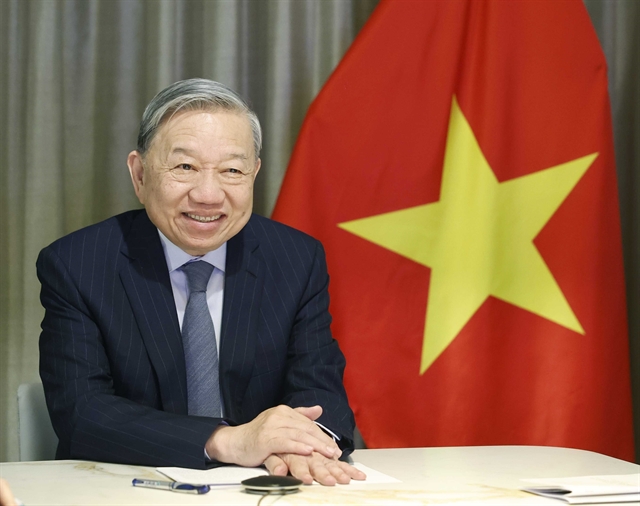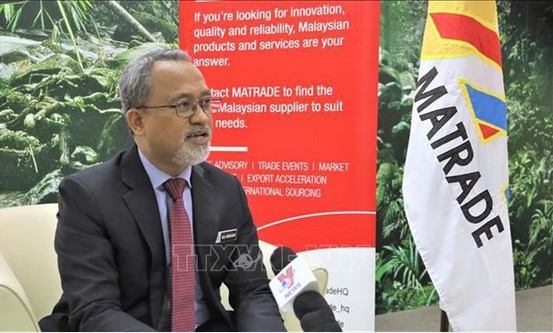 Politics & Law
Politics & Law

Việt Nam - Malaysia trade has recorded positive signals despite difficulties and challenges caused by the COVID-19 pandemic, potentially achieving a two-way turnover of US$18 billion in 2025, according to Malaysia External Trade Development Corporation (MATRADE) Director of ASEAN and Oceania Raja Badrulnizam Raja Kamalzaman.

|
| Malaysia External Trade Development Corporation (MATRADE) Director of ASEAN and Oceania Raja Badrulnizam Raja Kamalzaman. VNA Photo |
KUALA LUMPUR - Việt Nam - Malaysia trade has recorded positive signals despite difficulties and challenges caused by the COVID-19 pandemic, potentially achieving a two-way turnover of US$18 billion in 2025, according to Malaysia External Trade Development Corporation (MATRADE) Director of ASEAN and Oceania Raja Badrulnizam Raja Kamalzaman.
Talking to the Việt Nam News Agency on the occasion of the upcoming official visit to Việt Nam by Malaysian Prime Minister Dato' Sri Ismail Sabri bin Yaakob on March 20-21, Raja Badrulnizam said Việt Nam was the 11th biggest trade partner and the 7th largest export market of Malaysia.
According to the Department of Statistics Malaysia (DOSM), the bilateral trade reached US$16.71 billion last year, up 41.6 per cent compared to 2020.
The figures show a positive development since the two countries established diplomatic relations in 1973 and upgraded their ties to a strategic partnership in 2015.
The two countries are striving to realise a two-way trade target of US$25 billion by 2030.
Raja Badrulnizam revealed that his country’s trade had improved exponentially with a remarkable mark on trade, export and import.
He affirmed that the Regional Comprehensive Economic Partnership (RCEP) which entered into force in early 2022, in which both Malaysia and Việt Nam completed their ratification process, would contribute to boosting the bilateral trade.
To promote the Malaysia - Việt Nam trade, especially to increase Malaysia's exports to the Vietnamese market in particular and regional countries in general, MATRADE had set out three agendas in combination with creating favourable conditions for Malaysian businesses to invest and export abroad, he added.
The agendas focus on building a sustainable business environment, digitising trade activities, and implementing specific initiatives on the basis of Malaysia’s national trade master plan.
The official invited Vietnamese businesses to participate in the 18th Malaysia International Halal Showcase (MIHAS) 2022 which will take place from September 7-10.
As the world's largest Halal exhibition centre, MIHAS would be the best opportunity for Vietnamese companies to expand their Halal market, he noted.
Strategic partnership
The official visit to Việt Nam by Malaysian Prime Minister Dato’ Sri Ismail Sabri bin Yaakob on March 20 - 21 is expected to help intensify the two countries’ strategic partnership in a more substantive manner.
The trip, to be made at the invitation of Prime Minister Phạm Minh Chính, will be the first tour of Việt Nam by the Malaysian leader since he took office in August 2021.
The two countries established diplomatic ties on March 30, 1973, and elevated their relations to a strategic partnership in August 2015.
Over the past years, they have frequently organised mutual visits and high-level meetings, including the visits to Việt Nam by Sultan Muhammad V in March 2009 and September 2013, PM Najib Tun Razak in April 2014, and PM Mahathir Mohamad in August 2019; along with the trips to Malaysia by President Trương Tấn Sang in September 2011 and PM Nguyễn Tấn Dũng in August 2015.
High-level meetings have been held in flexible forms such as talks over the phone and via videoconference since 2020 despite the COVID-19 pandemic.
Some bilateral cooperation mechanisms have been carried out effectively, including the joint committee for economic, scientific, and technical cooperation, the defence cooperation committee, the joint trade committee, and the scientific and technological cooperation committee.
Defence ties have been maintained through all-level delegation exchanges, personnel training, and experience sharing. Meanwhile, security cooperation has continually been enhanced as seen in increased sharing of information about terrorism, cybercrime, and transnational crime, along with an agreement on cooperation in transnational crime prevention and control signed in 2015.
In 2021, Malaysia ranked second in ASEAN and ninth in the world among the trade partners of Việt Nam, which in turn was the third largest trade partner of the former. Bilateral trade reached US$12.5 billion last year, up 25.3 per cent from 2020. Việt Nam exports mainly telephones and components, crude oil, rice coffee, and seafood to Malaysia while importing mostly computers, electronic products, machinery, equipment, petrol, household appliances and components, and chemicals. Their trade value was approximately US$2.2 billion in the first two months of 2022, up 20 per cent year on year.
In terms of investment, Malaysia currently ranks second among the ASEAN nations and 10th among the 140 countries and territories investing in Việt Nam, with 668 valid projects worth US$13 billion. Việt Nam has 21 valid projects with registered capital totalling US$853 million in Malaysia, making the latter the ninth biggest among the 78 overseas investment destinations of Việt Nam.
There are more than 1,000 Vietnamese students in Malaysia at present. The two sides signed a memorandum of understanding on educational cooperation on March 6, 2019, and an agreement on tourism partnership in 1994. Since visa exemption was applied to ordinary passport holders of the two countries in September 2001, the number of Malaysian tourists to Việt Nam has grown fast, topping 605,000 arrivals in 2019, rising 12.2 per cent from the previous year.
About 29,000 Vietnamese people are living in Malaysia, most of them manual workers.
Over the last couple of years, facing the COVID-19 outbreak, the two sides made joint efforts to cope with the pandemic. Việt Nam donated 6,500 sets of personal protective equipment worth US$50,000 and 20,000 medical face masks to Malaysia.
Neermal Shunmugam, Chargé d’ affaires of the Malaysia Embassy in Việt Nam, said the visit by PM Dato’ Sri Ismail Sabri bin Yaakob aimed to further enhance post-pandemic cooperation and would also provide a chance for both sides to explore new aspects of bilateral ties, discuss regional and international issues of common concern, and promote bilateral trade and investment. VNA/VNS




